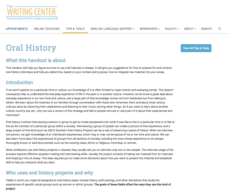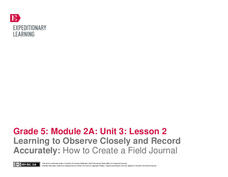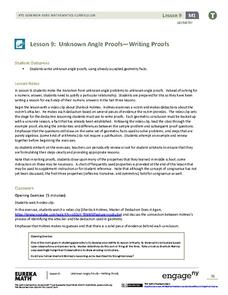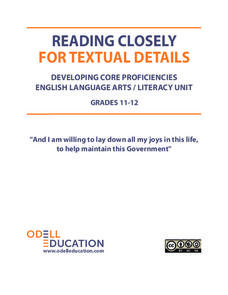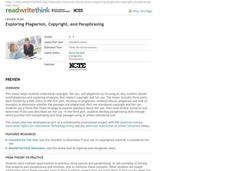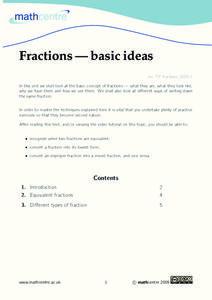Curated OER
"How To Build A Snowman" Expository Writing
Fourth graders write a "how to..." or an expository essay on building a snowman. They practice giving directions by explaining how to draw a person using shapes without mentioning that it's a person being drawn. They revise through the...
University of North Carolina
Literature (Fiction)
An informative installment of the Writing for Specific Fields series helps readers learn how to interpret and write about fiction. The website details nine easy steps for writing a literary analysis—a useful method for all readers!
California Education Partners
Seeing Eye to Eye
A performance task challenges scholars to read an informational text then respond with an explanatory essay. The exam begins with an independent reading of Seeing Eye to Eye by Leslie Hall. A second reading follows with the completion of...
University of North Carolina
Oral History
There's no better way to learn something than to hear it straight from the horse's mouth. A handout on oral history, part of a larger series on specific writing assignments, explains how to conduct interviews and use the information...
EngageNY
Learning to Observe Closely and Record Accurately: How to Create a Field Journal
Look carefully. Scholars practice observing and recording the natural world around them by looking out a window or viewing an image. Learners discuss how their experience compares to that of Meg Lowman in The Most
Beautiful Roof in the...
EngageNY
Unknown Angle Proofs—Writing Proofs
What do Sherlock Holmes and geometry have in common? Why, it is a matter of deductive reasoning as the class learns how to justify each step of a problem. Pupils then present a known fact to ensure that their decision is correct.
Poetry4kids
Twenty Fun Writing Prompts for Kids
Twenty prompts reinforce scholars' writing skills of essays and poems. Prompts cover topics such as superpowers, holidays, the weather, and more!
Open Oregon Educational Resources
How to Learn Like a Pro!
What's the best way to ace an exam or pass a difficult class? Scholars find out using an information-packed eBook. Pupils read about learning styles, study skills, test-taking strategies, and other topics associated with maximizing...
Missouri Department of Elementary
So Much to Do, So Little Time: How Do I Tie All of the Loose Ends Together?
How do people manage to get everything done when there are so few hours in a day? Scholars explore the question as they participate in small group discussions about time management. They construct a daily schedule and complete a...
K20 LEARN
Writing An Argumentative Paragraph: Argumentative Writing
Learning how to craft a cogent argument based on a solid claim, supported with evidence and solid reasoning, is an important life skill. Teach middle schoolers about argumentative writing with a lesson asking them to analyze the claims,...
EngageNY
Word Problems Leading to Rational Equations
Show learners how to apply rational equations to the real world. Learners solve problems such as those involving averages and dilution. They write equations to model the situation and then solve them to answer the question — great...
Odell Education
Reading Closely for Textual Details: "And I am willing to lay down all my joys in this life..."
Look closely, some details are hidden! Scholars learn how to find attributes by first examining characteristics in illustrations and then move to locating details in text with close reading. The teacher models good practices for...
Curated OER
How to Locate and Evaluate Information, Part III - Internet Sites
This is the third in a series of lessons scaffolding the research paper. It purports to teach researchers how to evaluate internet sites, but the lack of links, specific criteria, or site evaluation rubrics would require additional...
Curated OER
Writer's Toolbox
Present the class with a slide show that will give them a great head start in writing expository and narrative texts. The information is highlighted for easy note taking, well organized, and presented in a kid-friendly manner. It...
Facing History and Ourselves
How Journalists Minimize Bias
Class members are challenged to write a neutral news story about the events they observe in a short video. After sharing their stories in groups and discussing the different perceptions, the class concludes with a video of journalists...
Curated OER
Proofreading, Revising, & Editing Skills Success
Some self-paced writing resources are just better than others. This one is great. The 205-page packet includes exercises on every aspect of the writing process, from crafting sentences and paragraphs, to proofreading, revising, and...
Curated OER
From Graphic Organizer to Composition - Grade Six
How does one use a graphic organizer to plan writing? Introduce your writers to different types of graphic organizers by dividing the class into groups and assigning each group a particular organizer. Then, as they research chocolate...
University of North Carolina
Annotated Bibliographies
When researchers write a paper, they become curators of information. It's their job to determine the best sources of information on a topic and use those sources to inform their writing. As part of a larger series, a handout on annotated...
One Stop English
A Lesson on Register
The classroom might not be the best place for informal language, but it's a great place to teach middle and high schoolers how to identify the correct language register for their audience. A short lesson on formal and informal language...
Dream of a Nation
Writing an Analytic Essay
After researching an issue introduced in Tyson Miller's Dream of a Nation: Inspiring Ideas for a Better America, writers develop an original thesis statement and craft an analytic essay using evidence collected in their research.
University of North Carolina
Qualifiers
A lot of writers really struggle very much with adding a lot of qualifiers and intensifiers in their writing. Part of a larger series to improve writing skills, a handout on the topic provides tips to help reduce a reliance on these...
ReadWriteThink
Exploring Plagiarism, Copyright, and Paraphrasing
Plagiarism, copyright, and fair use are the focus of a three-part instructional activity designed to inform scholars of how to properly cite others' work. First, pupils use a KWL chart to begin thinking and discussing plagiarism. They...
EngageNY
Writing Division Expressions II
Division is division is division is division ... four different ways to write division. Scholars continue to learn about division expressions. They translate between several forms, including verbal phrases, expressions using the division...
Math Centre UK
Fractions—Basic Ideas
What are fractions? Find out using a reference page and video that goes in depth on how to make fractions equivalent, write fractions in simplest form, convert improper fractions into mixed numbers, and vice versa. Following the detailed...





